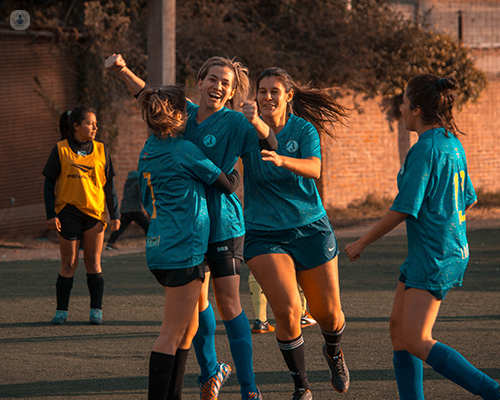ACL injuries in women: An expert’s case study
Written in association with:For over 15 years, it's been recognised that females face a significantly higher risk of ACL injuries compared to males, attributed to various factors including hormonal, physiological, and perhaps most notably, biomechanical aspects. This heightened risk underscores the importance of raising awareness and implementing preventive measures. In his latest online article, consultant knee surgeon Professor Nick London offers his expert insights into ACL injuries in women, exploring one woman’s ACL recovery journey: professional footballer Chloe Kelly.

On July 31st 2022, Chloe Kelly achieved what had eluded English footballers for decades, since the era of Geoff Hurst: she netted the winning goal in the final of a major football tournament, against Germany no less. At long last, football had come home.
Chloe’s winning goal was all the more impressive, as she had overcome a significant ACL injury in the run-up to the competition. Chloe's prospects of even participating in the final seemed improbable, considering her journey. During the 2020/21 season with her club, Manchester City, a collision with Birmingham City's Rebecca Holloway resulted in an ACL rupture, sidelining her for 11 months and forcing her to miss the Tokyo Olympics.
Alongside her physical struggles, she faced what she termed as pervasive "negativity" surrounding her injury, which took a toll on her mental well-being during the rehabilitation process.
As women’s involvement in football continues to rise, so does the incidence of ACL injuries. The Lionesses’ European victory may further fuel this trend, highlighting the urgency of proactive measures to mitigate risks, not only in professional spheres but also at amateur levels. Ongoing research (enabled and supported by Nick London and his colleagues) at Leeds Beckett University aims to comprehensively address these factors and devise programs to optimise movement patterns, aiming to ultimately reduce ligament injuries among all players.
Yet, mitigating injury rates is only one facet of the challenge. Chloe Kelly's remarks underscore the need to shift the narrative surrounding ACL injuries, recognising and addressing the detrimental impact of negativity on mental health during recovery. The prevailing pessimism surrounding ACL injuries, as Chloe highlights, can exacerbate the already arduous rehabilitation process.
As someone who has treated ACL tears for decades, Nick London shares Chloe's concern regarding the persisting stigma associated with these injuries. While ACL tears remain a serious concern, advancements in treatment and rehabilitation have significantly improved outcomes. The overwhelming majority of athletes now successfully return to their sport post-injury and most return to the same level of sport. This signals a major shift from the bleak outlook of previous decades.
Chloe Kelly's experience emphasises the importance of acknowledging ACL injuries as part of the sport's landscape, akin to other common injuries. Medical professionals, coaches, and peers must recognise the psychological impact of such injuries and provide comprehensive support throughout the recovery journey. As Chloe exemplifies, overcoming an ACL injury is not a barrier to achieving athletic excellence.
Professor Nick London is a renowned specialist knee surgeon based in Harrogate & Leeds and manages sports injuries in children and adults. If you would like to book a consultation with Professor London, you can do so today via his Top Doctors profile.


